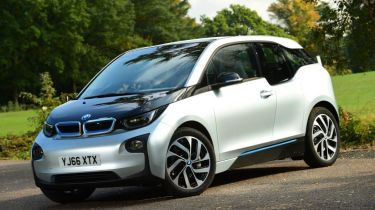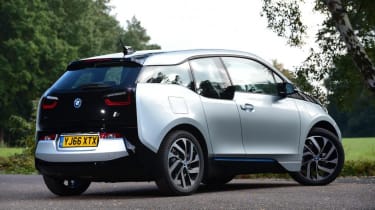Used BMW i3 buying guide
Does BMW's pioneering urban electric car make sense secondhand? Here's all you need to know

Like the Nissan Leaf, the BMW i3 was designed from the outset to be an electric car, not developed from what was originally a combustion-engined model. It was initially offered in pure-electric and range-extender versions, but when a facelift boosted battery capacity and therefore driving range, the range-extender was discontinued. Here, we take a look at secondhand examples of both versions and ask whether they still make sense as a used buy several years down the line.
History
In summer 2011, BMW showed an i3 concept, but it was another two years before the production version appeared. Five-door has always been the only bodystyle and initially battery capacity was 22kWh, for a claimed range 80-100 miles for the pure-electric version, or 160-186 miles for the range extender (referred to as REx for short).
The range extender uses a 650cc, two-cylinder motorbike engine with a small fuel tank as a generator to top up the car's batteries when they're depleted, but it never directly drives the i3's wheels.
July 2016 saw the arrival of a larger 33kWh battery, and then in 2017 a comprehensive refresh boosted the electric motor's power from 168 to 181bhp, tweaked the styling and added the sporty i3s model to the line-up.
Which one should I buy?
The extra usability of the range extender is appealing, but this also means prices on the used market are stronger – something compounded by the fact that you can no longer buyer a brand-new i3 REx.
Starting out, only one trim level was offered, but there were four different 'finishes', or interior colour schemes, called Standard (black and dark grey), Loft (light and mid grey), Lodge (light and mid grey) and Suite (dark brown).
All i3s got cruise control, 19-inch alloy wheels, heated front seats, climate control, DAB radio and sat nav as standard. With the i3s, you got an extra 13bhp from the electric motor, as well as 20-inch wheels, sports suspension and some slight visual tweaks to the exterior.
You can currently buy BMW i3 models from $7,791, or $0.00 per month on our sister site BuyaCar.Used BMW i3 alternatives
When it comes to affordable used electric cars, the Renault ZOE and Nissan Leaf are the obvious suggestions, although neither feels anything like as upmarket as the stylish i3. Both will be significantly cheaper, though, while offering a similar electric driving range.
There's also the Volkswagen e-Golf, which seems much more 'ordinary' than the i3 due to looking very similar to a petrol or diesel Golf, but some may prefer this under-the-radar approach. Then there's the Hyundai Ioniq Electric and Kona Electric, but they haven't been on sale as long as the i3, so it'll be a while before prices come down to comparable levels.
What to look for
Battery: BMW didn't offer battery leasing for the i3, so there's no worry about whether you own the battery or not when shopping for a used example.
Charger: The i3 didn't come with fast-charging capability as standard; the original buyer had to specify it as an optional extra
Bodywork: As the i3 is made of carbon-fibre, even minor dents can be expensive and difficult to repair, so inspect any car you're looking at carefully
Upholstery: The i3's leather doesn't seem to be ageing very well and can be stained by dark clothes. The cloth trim is a more durable option
Interior: Note that the i3 is strictly a four-seater: there's no middle rear seat. Getting in and out of the back is easy, though, thanks to the unique door design
Running costs
As with any electric car, the i3's paucity of moving parts compared to a combustion-engined vehicle makes it cheaper to run than a petrol or diesel equivalent. It'll still need brake-pad changes like any car, while its heating system needs coolant topping up occasionally.
With the i3 REx, the chain-driven motorbike engine needs an oil and filter change every two years or 12,000, at a cost of just over £200.
Some i3s were bought with service packs that covered the cost of maintenance for the first three years of their time on the road, but it's not possible to extend such plans for older cars.
The i3 should be reliable, too – according to data published by warranty provider Warrantywise, the i3 had a repair rate of 18% against all of its active policies. The closest an internal-combustion BMW could get was 21%.
Recalls
Only one recall has been issued for the i3 so far; it concerned incorrectly calibrated sensors in the electric power steering system that could lead to a loss of control when cornering. Fortunately, only 41 cars were affected, built between October and November 2015.
Verdict
After several years on sale, the BMW i3 still looks futuristic and eye-catching, and may even achieve classic status in the future due to being one of the pioneering electric cars. However, the very earliest models have limited usefulness due to their very short range (which will have further decreased with age).
That's why we recommend the facelifted version with the 33kWh battery as an everyday car. The i3 sold strongly in the UK, so plenty are available secondhand, and reliability seems to be good. It's not the cheapest route into secondhand electric-car ownership, but it is one of the more interesting and desirable options.
